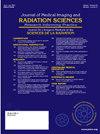Optimizing Premedication Strategies for Iodinated Contrast Media in CT scans: A Literature Review
IF 1.3
Q3 RADIOLOGY, NUCLEAR MEDICINE & MEDICAL IMAGING
Journal of Medical Imaging and Radiation Sciences
Pub Date : 2024-11-20
DOI:10.1016/j.jmir.2024.101782
引用次数: 0
Abstract
Background
Computed tomography (CT) has revolutionized medical imaging, enabling cross-sectional evaluation of the human body. The increasing utilization of iodinated contrast media (ICM) in contrast-enhanced CT scans has raised concerns about potential adverse reactions. This literature review investigates the efficacy of premedication regimens in preventing severe allergic reactions to intravenous ICM. The study explores the ongoing debate between premedication and the use of alternative contrast agents, such as low-osmolarity contrast media (LOCM). Also, it evaluates the potential role of orally administered steroids in reducing breakthrough reactions.
Methods
This study conducted a literature review to identify the most effective premedication regimens for preventing severe hypersensitivity reactions to intravenous ICM. Searches were performed across multiple databases, focusing on peer-reviewed articles written in English and published after 2010. A total of 10 articles were selected based on strict inclusion criteria, and their findings were summarized and analyzed.
Results
The review identified that premedication with corticosteroids and antihistamines can significantly reduce the likelihood of hypersensitivity reactions in patients with a history of allergic reactions to ICM. However, the effectiveness of premedication in completely preventing reactions is limited, with breakthrough reactions still occurring. Studies also highlighted that switching to non-ionic low-osmolarity contrast media (LOCM) may offer a more substantial reduction in hypersensitivity reactions compared to premedication alone, although cost and availability constraints limit its widespread use.
Conclusion
Premedication with corticosteroids and antihistamines is beneficial in reducing hypersensitivity reactions to ICM, but its effectiveness is not absolute. Switching to LOCM may further reduce the risk, though practical limitations exist. The combination of premedication and changing the type of ICM may offer a more comprehensive approach. Further research is needed to refine premedication strategies, particularly in diverse patient populations, and to understand the impact of scan-related factors on allergic reactions.
优化 CT 扫描中碘对比剂的用药前策略:文献综述。
背景:计算机断层扫描(CT)为医学成像带来了革命性的变化,可对人体进行横断面评估。随着碘造影剂(ICM)在造影增强 CT 扫描中的应用越来越广泛,人们对其潜在的不良反应产生了担忧。本文献综述探讨了预用药方案在预防静脉注射 ICM 引起严重过敏反应方面的功效。研究探讨了预处理与使用低渗透压造影剂 (LOCM) 等替代造影剂之间的争论。此外,研究还评估了口服类固醇在减少突破性反应方面的潜在作用:本研究进行了文献综述,以确定预防静脉注射 ICM 严重超敏反应的最有效预处理方案。研究人员在多个数据库中进行了检索,重点关注 2010 年后发表的同行评审过的英文文章。根据严格的纳入标准,共筛选出 10 篇文章,并对其研究结果进行了总结和分析:结果:综述发现,使用皮质类固醇和抗组胺药进行预处理可显著降低有 ICM 过敏反应史的患者发生超敏反应的可能性。然而,预先用药在完全防止反应方面的效果有限,突破性反应仍时有发生。研究还强调,与单纯的预处理相比,改用非离子型低渗透压造影剂(LOCM)可更大程度地减少超敏反应,但成本和供应限制了其广泛使用:结论:使用皮质类固醇和抗组胺药进行预处理有利于减少 ICM 超敏反应,但其效果并非绝对。改用 LOCM 可进一步降低风险,但存在实际限制。结合使用预用药和改变 ICM 的类型可能是一种更全面的方法。还需要进一步的研究来完善预处理策略,尤其是针对不同的患者群体,并了解扫描相关因素对过敏反应的影响。
本文章由计算机程序翻译,如有差异,请以英文原文为准。
求助全文
约1分钟内获得全文
求助全文
来源期刊

Journal of Medical Imaging and Radiation Sciences
RADIOLOGY, NUCLEAR MEDICINE & MEDICAL IMAGING-
CiteScore
2.30
自引率
11.10%
发文量
231
审稿时长
53 days
期刊介绍:
Journal of Medical Imaging and Radiation Sciences is the official peer-reviewed journal of the Canadian Association of Medical Radiation Technologists. This journal is published four times a year and is circulated to approximately 11,000 medical radiation technologists, libraries and radiology departments throughout Canada, the United States and overseas. The Journal publishes articles on recent research, new technology and techniques, professional practices, technologists viewpoints as well as relevant book reviews.
 求助内容:
求助内容: 应助结果提醒方式:
应助结果提醒方式:


